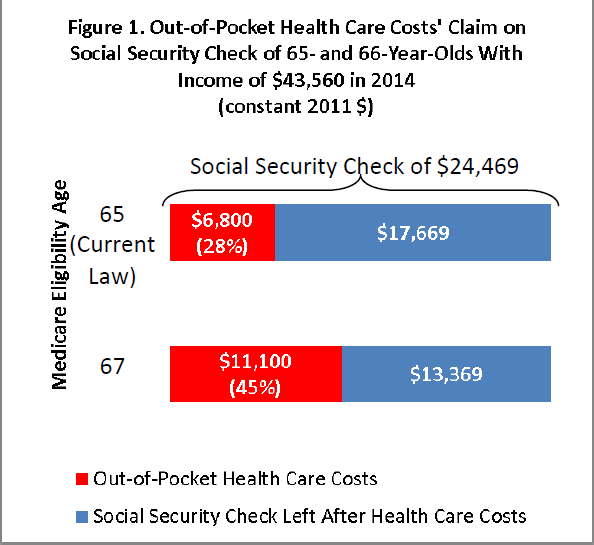A proposal to increase the Medicare eligibility age, which the Super Committee is considering, would drive up health care costs to the point where they would consume almost half of the Social Security check of a middle-class retiree, according to a new analysis by Social Security Works.
In his testimony before the Super Committee yesterday, Erskine Bowles, a Morgan Stanley executive and co-chair of the President's Fiscal Commission, recommended raising the Medicare eligibility age to 67 as a way to bridge the differences between Democrats and Republicans on the Super Committee.
Bowles explained his support for the policy on the grounds that the Affordable Care Act (ACA) made "other coverage available" to 65- and 66-year-olds, by providing subsidies to purchase health care in the private sector.
Bowles' testimony in favor of raising the age comes on the heels of public endorsements by the American Hospital Association, the leading trade association for the nation's for-profit hospitals, and the Healthcare Leadership Consortium, a consortium of health insurance companies, pharmaceutical companies, and other medical providers.
The Center on Budget & Policy Priorities, a center-left think tank, criticized Bowles' compromise for being "to the right of Boehner's offer to Obama in July." They dismissed, in particular, Bowles' reliance on the ACA to justify raising the Medicare eligibility age. Robert Greenstein, the Center's President, wrote that without assurance that ACA will withstand overwhelming Republican political and legal opposition, Bowles' proposal to raise the Medicare eligibility age "would risk leaving many 65- and 66-year-olds with no insurance at all at the very time of life when they are developing more medical conditions and problems due to their age."
Even if ACA is successfully implemented, however, many experts believe raising the Medicare eligibility age would be poor policy. A study by the Kaiser Family Foundation found that raising the Medicare eligibility age to 67 would increase health care costs across the economy, saving the government little money. What money the government would save, the Kaiser study found, would come from shifting the costs of care onto patients -- especially, but not only, individuals aged 65 and 66, who would no longer be eligible for Medicare.
A new analysis of the Kaiser study by Social Security Works shows that the increase in out-of-pocket costs for 3.3 million people aged 65 and 66 would take a large bite out of affected seniors' already modest Social Security checks.
From Social Security Works' analysis:
Of the 3.3 million people aged 65 and 66 who would pay more out-of-pocket for health care if they were no longer eligible for Medicare, the following two groups would be hit especially hard:
- Out-of-pocket health care costs would increase, on average, by $4,300 in 2014 for 960,000 people aged 65 and 66 who purchase coverage through a health insurance exchange and have incomes exceeding 400 percent of the federal poverty level ($43,560), making them ineligible for subsidies available to exchange participants with lower incomes. Under current law, these 65- and 66-year-old retirees' average out-of-pocket costs would be $6,800 in 2014, out of a total Social Security benefit of $24,469. If forced out of Medicare and onto the health insurance exchanges, their average out-of-pocket health care costs would grow to $11,100, out of a total Social Security benefit of $24,469. [Figure 1] As a result, if the Medicare eligibility age is raised, out-of-pocket health care costs would go from consuming 28 percent to 45 percent of those 65- and 66-year-old retirees' Social Security check.
Sources: Social Security Works analysis of estimates from Social Security Trustees, 2011, and Kaiser Family Foundation, 2011.- Out-of-pocket costs would increase, on average, by $1,200 for 240,000 people aged 65 and 66 who purchase coverage through a health insurance exchange and have incomes between 300 and 400 percent of the federal poverty level ($32,670-$43,560). Under current law, these 65- and 66-year-old retirees' average out-of-pocket costs would be $4,800 in 2014, out of a total Social Security benefit of $18,464. If forced out of Medicare and onto the health insurance exchanges, their average out-of-pocket health care costs would grow to $6,000, out of a total Social Security benefit of $18,464. As a result, if the Medicare eligibility age is raised, out-of-pocket health care costs would go from consuming 26 percent to 32 percent of those 65- and 66-year-old retirees' Social Security check.
Costs to Social Security beneficiaries could be substantially higher than estimated here. The out-of-pocket costs discussed in Social Security Works' analysis do not include the cost of medical services that are not covered by Medicare at all, including dental care and most kinds of long-term care, such as permanent residency in a nursing home. Accounting for these medical services would not have any bearing on the amount that out-of-pocket costs would increase if the Medicare eligibility were raised to 67. It would, however, show average out-of-pocket costs to be considerably larger under both current law and if the Medicare eligibility were raised to 67.
Views expressed are those of the author, and do not reflect the opinions of Social Security Works or the Strengthen Social Security Campaign.
?
Follow Daniel Marans on Twitter: www.twitter.com/danielmarans
Source: http://www.huffingtonpost.com/daniel-marans/raising-medicare-eligibil_b_1074019.html
us constitution us constitution articles of confederation articles of confederation current events current events nick lowe

No comments:
Post a Comment